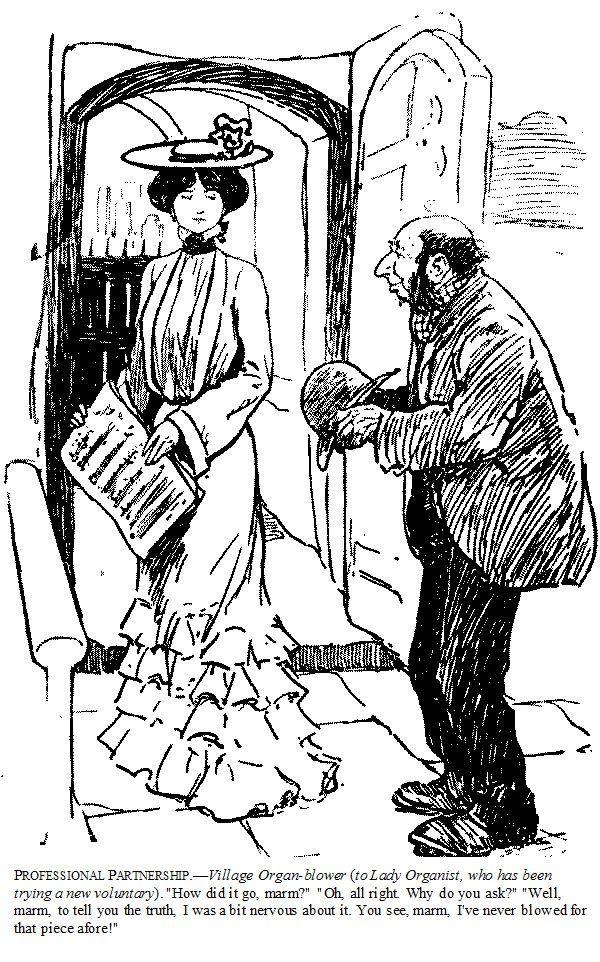Taken a shine to the new lady organist who has just started at your church? Fancy seeing more of that young organ scholar you met at a recital? Organists are not gregarious souls, and it can take an effort to make friends. Allow THE LADY ORGANIST to give you some tips on good chat-up lines, and guidance on what to avoid in those tricky early conversations.
Talking about the weather
Talking about the weather is not such a cop-out as you might think, as all pipe organs are very susceptible to the weather. If it’s cold and wet almost any part of their complicated mechanism can stick. If it’s hot they go out of tune. Almost any atmospheric conditions can trigger a cipher – when a note won’t stop sounding however much you kick and shove. All these things are annoying and distressing to your organist, who is expected to soldier on regardless. Whatever the weather, then, you can make sympathetic noises and win a lot of brownie points.
Talking about music
Music is another obvious ice-breaker, as the repertoire for the organ is one of the largest for any instrument, going back hundreds of years. The music of JS Bach is such a joy and such a mainstay of the organist’s repertoire that it almost goes without saying – so much without saying, in fact, that only amateurs get excited about him. A sage nod or two is all that is required when discussing Bach. Memorising a few BWV catalogue numbers might help. Purse your lips in recognition if someone mentions any BWV number between 525 and 530 – the Trio Sonatas, a bit of an Everest as far as organists are concerned. However avoid all mention of BWV 565 which is the famous/infamous D minor Toccata (and possibly not even written by Bach) and considered a bit corny (although it is actually great fun to play).
Almost all French organ music can be brought into the conversation with enthusiasm, from the Baroque, confusingly called French Classical (Couperin and Daquin are names to drop here) to challenging modern stuff (Alain, Messiaen). The big exception to this is the Widor Toccata. “Francis Jackson has a lot to answer for…” is the best thing to murmur if your organist moans about being asked to play it for a wedding (though you can earn some credibility by letting slip that you know the Toccata is the last movement of Widor’s Symphony for Organ No5 in F minor. You can add “Opus 42 No 1, I believe,” if you must, but don’t get too cocky, there’s a way to go yet.)
British organ composers are a complex issue. The Early English organ and its music weren’t anything like as well developed as on the European continent. “Charming” or “elegant” are safe words to use of 18th century English organ music (you’ll recognise it as pretty but all a bit samey). Everyone is allowed to love Elgar’s organ music (you could try “appealing though emotionally complex” here). Organists have been carrying a torch for years for many of the lesser twentieth century British composers, and some of these are slowly coming back into mainstream fashion. So a good tactic might be to confess a weakness for the music of say, Percy Whitlock, and see how your organist reacts.
Be non-committal about late 20th and 21st century music until you have discovered whether your organist actually likes it, or whether you see stormclouds approaching at the mere mention of Paul Patterson or Brian Brockless. A lot of late 20th and 21st century organ music is loud, difficult and long, so be wary if your organist is too keen on it – you might end up at endless avant-garde recitals, when actually you’d prefer to hear Bach and Buxtehude.
Talking about the instrument
You should swoon with rapture at any mention of organ maker Cavaille-Coll, though don’t make the mistake of asking if the instrument at your church is a Cavaille-Coll as there are very few outside France.
If the organ you are standing next to is small and cranky with just a few stops it is either (a) a fantastic historic organ, or (b) a heap of old junk left over from the Victorian age, or (c) both. Avoid derogatory remarks until you’re certain. If the instrument is large with keyboards going up like a staircase and lots of bells and whistles, look suitably awestruck, and make a comment about it being “splendid for the Romantic repertoire” (possibly with a knowing smile, depending on how well your chat-up is going).
Talking about tuning
Just don’t start a conversation about tuning. If you’ve found an organist who is really into this, you will spend the rest of the evening trying not to fall asleep over the finer distinctions between Werckmeister 3 and Shifted Vallotti.
Visiting the organ loft
Although the organ technically belongs to the church or building it resides in, in reality it is the jealously guarded fiefdom of the organist. So if you’ve been invited up to the organ loft your chat-up lines are obviously working. However don’t expect an atmosphere of reverence during a church service. A professional organist and choir will spend most of their time up there surreptitiously drinking coffee, catching up with Twitter and Facebook, and booking each other for gigs the following week. Only when required will they snap into performance mode. Your best strategy is just to look interested throughout and say “nice registration for the Nunc Dimittis” afterwards.
Discussing other organists
As there is only room for one organist at any one instrument at any one time, mention of other organists can be a bit ticklish. British organists are not as well paid as their counterparts in the rest of Europe or the US, which makes them a bit grumpy. Undiluted praise for another organist is probably best avoided until your organist invites you to accompany them to a recital by say, Jennifer Bate at the Royal Festival Hall, when you can safely enthuse.
Before you embark on your pursuit of the lovely organist, however, a caution: do you want to always be the one who cooks Sunday lunch, as your organist is inevitably playing all morning? Do you want to spend your holidays on organ crawls round obscure churches in East Germany because Bach played there once? Do you want your home to resound to the strains of two-star religious music because your organist has to practice this stuff for Sunday? Then there’s the instrument: do you want your sitting room taken over by a large lump of digital organ replete with pedalboard to trip over, or a real pipe organ (it happens), or a mess of wires, screens and electronic doodads because your organist is into Hauptwerk and wants to reproduce exactly the sound of the 1738 organ at Haarlem St Bavokerk? Other, and easier, varieties of musician are available.






Well written Morwenna and right on the button!
Cheers
David
Very entertaining!
Love it! Now we need a version to chat up male organists?
I once wrote a prose poem celebrating the organists beauty. The words arose in my mind one day when she leaned over the keys without her cardigan and her bra showed beneath her top. It was as lovely as a neatly written line of notes in a stave and I never saw a more perfect accentuation of a lady’s femininity. I later gave the piece of writing to her and quite surprisingly she said she appreciated and liked every word of it. She said it was one of the most beautiful things anyone had ever given her.I was overjoyed and went out into the joys of summer.
@Jason I’m so glad your organist appreciated the words you wrote – what happened next? 2 years later are you married to her? I do hope so. I had a similar moment at church last week when I observed the attractive male organist tickling the ivories during choir practice – the top button of his shirt was unfastened and he wasn’t wearing a tie. I got a tantalising glimpse of his chest hair. It made my day. Sadly for me, he is married.
“Do you want to spend your holidays on organ crawls round obscure churches in East Germany because Bach played there once?”
Essentially, this is all I have ever wanted to do on holiday.
A very charming article! I’m a church organist and any ladies (and gents) out there wondering how to chat up a male church organist, well it’s very simple….
[Gordon, thank you for taking the time to comment here – I really enjoy people’s involvement with the blog! But apologies, I have deleted the rest of your comment as I thought it was a bit marginal in tone for a family website. All best wishes, Morwenna]